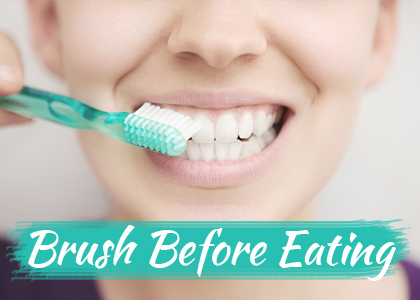Brushing Your Teeth – Are You Doing It Wrong?
 Did you know that certain times of day might be better for brushing than others? While it’s always recommended to brush your teeth twice per day, and floss once per day, your timing is also important.
Did you know that certain times of day might be better for brushing than others? While it’s always recommended to brush your teeth twice per day, and floss once per day, your timing is also important.
If you love your pearly whites and want to keep them around as long as possible (because face it, life would be pretty difficult without your teeth), read more to improve your tooth brushing game.
The Acid in Your Mouth
Some level of acid in your mouth is normal, especially after you eat. After you eat, the healthy bacteria in your mouth go to work to break down microscopic bits of food leftover (yum!) and they produce acid as a result. However, consuming too much sugar increases acid production beyond a healthy level. Snacking all day also keeps those bacteria working and producing more acid than your teeth can handle.
Why does this matter? Because long-term exposure to acid can erode your enamel, causing your teeth to become weak and decayed. Enamel is the hard, white, outer layer of your teeth and it’s essential for keeping your teeth strong, healthy, and decay- and pain-free. It’s important to understand the effects of acid on your teeth so that you can brush your teeth at the healthiest time of day.
Brushing After Eating
Highly acidic foods like citrus fruits can really take a toll on your tooth enamel even without the help of bacteria, and brushing too soon after eating can make matters worse. You want to protect your tooth enamel because it can’t ever be replaced once it’s gone.
According to the Mayo Clinic, if you eat something highly acidic, you should wait at least 30 minutes before brushing your teeth. It’s best to rinse out your mouth with water after eating instead. Be sure to spit the water out, don’t swallow it, and you can chew sugarless gum with xylitol if you really need to freshen your breath (hello, 2 o’clock meeting).
We know people have their preferences and routines, and people are usually firmly in one camp or the other when it comes to the habit of brushing either before breakfast or after. This information might make the case for brushing your teeth first thing in the morning (before breakfast), instead of after—especially if you’re going to have oranges, lemons, grapefruit, or coffee with breakfast.
Brushing does a world of good for your teeth in the morning, even before you’ve eaten. This is because you produce less saliva overnight, and saliva is very important for keeping your teeth clean and healthy!
The one time this rule doesn’t apply is right before bed. Having a midnight snack without brushing after is linked to increased tooth loss and tooth decay. No matter what you ate, you should always brush your teeth right before bed, just be sure to rinse your mouth with water first to minimize acidity and enamel damage.
The Importance of Brushing
Brushing your teeth properly is the foundation for oral health. Anything else you do would be pointless without brushing. Use fluoride toothpaste, a toothbrush that’s no more than three months old, and brush for two whole minutes twice a day. Brushing and flossing gently clean your teeth and prevents many potential problems that can develop if your oral care isn’t managed.
If you have questions about acid, enamel, or how to brush properly, make an appointment at Veranda Dentistry in Des Moines today! Dr. Chad Johnson is a professional dentist who can help your smile look and feel its best.
The content of this blog is not intended to be a substitute for professional medical advice, diagnosis, or treatment. Always seek the advice of qualified health providers with questions you may have regarding medical conditions.










